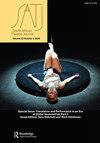Looking back to move forward: celebrating 20 years of an innovative contemporary African dance company
IF 0.2
0 THEATER
引用次数: 0
Abstract
Dance in South Africa is as complex as the diversity of cultures in her country. It reflects the nuances of socio-cultural mores that shape the ever-changing South African nation. The wealth of cultures and identities in South Africa pose an exciting challenge for many artists, particularly those located in the dance faculties, to define and articulate what is contemporary about South African dance and what is African about contemporary dance. The challenge towards normative and codified rigidities in dance practice and discourse functions as an unconventional entry by the Vuyani Dance Company (VDC) to embrace innovative and hybrid forms and modes of embodied representations through dance. The publication of Looking Back to Move Forward (2019) divulges the many ways the dance theatre of Gregory Maqoma – founder of Vuyani Dance Theatre (VDT) and VDC – innovates fresh movement vocabularies. It chronicles the practice of locating the self as a point of departure to excavating and performing embodied narratives about personal experiences that converge with societal histories. The meeting place between the private and the communal serves as the driving force of Maqoma’s success in making dance theatre. The book sheds light on Maqoma’s practice of embracing nostalgia and imagination to create future thinking narratives while inspiring lasting legacies. Looking Back to Move Forward (2019) performs two functions. Firstly, it cements the understanding that contemporary African dance is complex and transformative. The nature ofMaqoma’s method of creating dance theatre is celebrated in the book as it invites readers to journey through 20 years of a successful Black conceived and owned dance company in South Africa. In this layered, the distinct refusal to rigidities in dance practice has prompted a need to innovate Black orientated contemporary African dance. As evidenced in the book, the company achieved this by appreciating the multiplicious nature of Maqoma’s choreography that applies influences from the South, East, and West to formulate individual and interpersonal narratives of collective experiences. Furthermore, the book sheds light on Maqoma’s practice of examining the position of blackness in contemporary dance within the postcolonial African context. Finally, it provides frames of reference that reorientate contemporary African dance away from troubling labels such as ‘primitive’ or the homogenizing ‘ritual’ or ‘authentically African’ markers.回顾前进:庆祝非洲当代创新舞蹈团成立20周年
南非的舞蹈与该国文化的多样性一样复杂。它反映了塑造这个不断变化的南非国家的社会文化习俗的细微差别。南非丰富的文化和身份对许多艺术家,特别是舞蹈学院的艺术家来说,是一个令人兴奋的挑战,他们要定义和阐明南非舞蹈的当代性和当代舞蹈的非洲人性。舞蹈实践和话语中对规范性和规范性僵化的挑战,是武亚尼舞蹈团(VDC)通过舞蹈拥抱创新和混合形式和模式的非传统入口。《回顾前进》(2019)的出版揭示了Vuyani舞蹈剧院(VDT)和VDC创始人Gregory Maqoma的舞蹈剧院创新新鲜动作词汇的多种方式。它记录了将自我定位为出发点的实践,以挖掘和表演与社会历史相融合的关于个人经历的具体叙事。私人和公共之间的聚会场所是Maqoma成功制作舞蹈剧院的推动力。这本书揭示了Maqoma的实践,即拥抱怀旧和想象力,创造未来思考的叙事,同时激发持久的遗产。《展望未来》(2019)具有两个功能。首先,它巩固了人们对当代非洲舞蹈是复杂和变革的理解。马科马创建舞蹈剧院的方法在书中受到了赞扬,因为它邀请读者穿越20年来南非一家成功的黑人构思和拥有的舞蹈公司。在这种层次上,对舞蹈实践中僵化的明显拒绝促使人们需要创新以黑人为导向的当代非洲舞蹈。正如书中所证明的那样,该公司通过欣赏Maqoma编舞的多样性实现了这一点,该编舞运用了来自南部、东部和西部的影响,形成了集体经历的个人和人际叙事。此外,这本书揭示了马在后殖民非洲背景下审视黑人在当代舞蹈中地位的实践。最后,它提供了参考框架,将当代非洲舞蹈从“原始”或同质化的“仪式”或“真正的非洲”标记等令人不安的标签中重新定位。
本文章由计算机程序翻译,如有差异,请以英文原文为准。
求助全文
约1分钟内获得全文
求助全文

 求助内容:
求助内容: 应助结果提醒方式:
应助结果提醒方式:


